Life on Campus
Concerns over antisemitism, anti-Israel hostility, racial and ethnic discrimination, and free expression on college campuses have recently been at the forefront of national debate. Our campus studies series explores these critical issues with representative samples of Jewish and non-Jewish students.
Publications
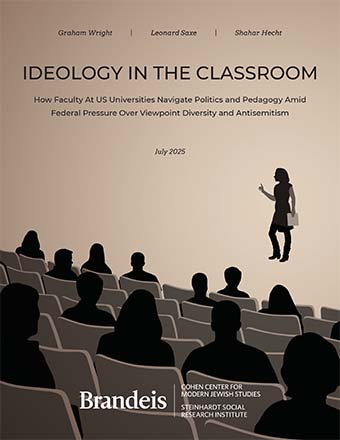
Report
July 2025
This study explores how faculty at US universities think about contentious political issues and how these issues are addressed in the classroom. The report examines the political identities and viewpoints of faculty, their levels of political activism, their concerns about being targeted because of their political views, their approach to addressing current political controversies in the classroom (climate change, racism in America, Donald Trump and American democracy, Russia-Ukraine, and the Israel-Palestine conflict), and the extent to which they hold hostile views about Jews and Israel. The study is based on a survey conducted in spring 2025 of more than 2, 200 faculty at the 146 Carnegie-2021 classified R1 universities, who taught undergraduates in the 2024-25 academic year. This study provides insights about the role faculty play in shaping the climate on campus, in light of the intense focus on viewpoint diversity and antisemitism at US universities and ongoing related federal investigations and funding cuts to university programs.
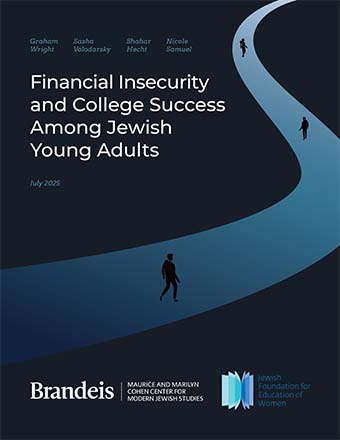
Report
July 2025
This report explores the impact of financial insecurity on the college trajectory of Jewish young adults. The findings are based on survey data collected in spring 2024, from 2,164 Jewish respondents, and from 19 in-depth follow-up interviews conducted in spring 2025. All respondents were ages 23-24 at the time of data collection. The report examines how those who grew up with the most financial need (16% of all respondents) compared to their peers who grew up in more affluent circumstances with respect to their journey from high school to college and beyond.
Journal article
March 2025
Sasha Volodarsky, Graham Wright, Shahar Hecht, and Leonard SaxeIn the 2023–2024 academic year reports of antisemitism on U.S. college campuses surged. At the same time, contentious debates about what antisemitism means reignited, in particular, with respect to criticism of Israel. The present study addresses this debate through a bottom-up approach that centers on the perspective of the targets of antisemitism. Surveys conducted during the 2023–2024 academic year with Jewish students on over 50 campuses reveal wide agreement that certain statements about Israel are inherently antisemitic and that these views remained stable over the academic year.
Journal of Jewish Education, 1–25. https://doi.org/10.1080/15244113.2025.2476546
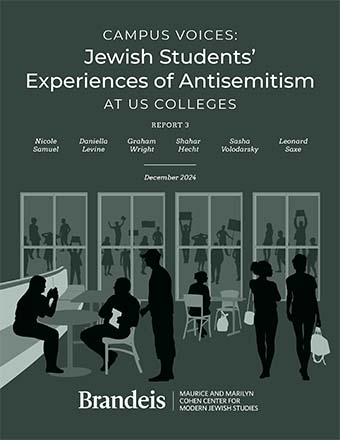
Report
December 2024
Nicole Samuel, Daniella Levine, Graham Wright, Shahar Hecht, Sasha Volodarsky, and Leonard SaxeThis report explores how October 7, the Israel-Hamas war, and the hostile climate on campus affected the day-to-day lives of Jewish students. Jewish students and Jewish campus professionals discuss the various responses to events on campus and how successful they were in addressing student concerns during the 2023-24 academic year. Drawing primarily on data collected through long-form interviews with Jewish students and Jewish campus professionals, the report also includes survey data from Jewish undergraduates collected in fall 2023 and spring 2024.
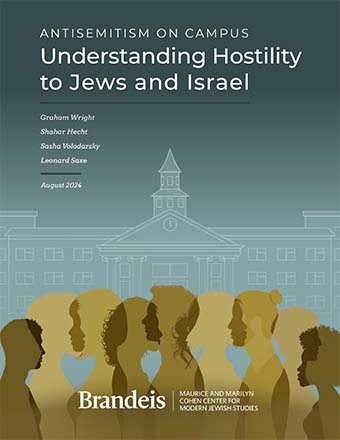
Report
August 2024
Graham Wright, Shahar Hecht, Sasha Volodarsky, and Leonard SaxeWe know that Jewish students have experienced a heightened hostile environment on many college campuses since October 7. But what are the factors that contribute to that climate? This study aims to understand the underlying influences that contribute to the perception of antisemitism on campus. In particular, how non-Jewish students think about Jews and Israel and how these views relate to their other political beliefs or philosophical outlooks. The data for the study were collected in the spring semester of 2024 from undergraduate students at 60 schools with large Jewish student bodies.
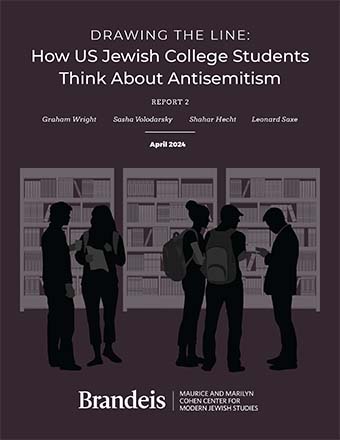
Report
April 2024
Graham Wright, Sasha Volodarsky, Shahar Hecht, and Leonard SaxeIn our December 2023 report, we documented the level of anti-Jewish and anti-Israel hostility on 51 US campuses since the October 7 Hamas attack on Israel. One question prompted by our findings was how Jewish students “draw the line” between acceptable political discourse and antisemitism. Guidelines developed to define antisemitism (IHRA, NEXUS, JDA) agree that while criticism of Israel is not necessarily antisemitic, particular statements can be, depending on the broader context. This report explores which forms of anti-Israel sentiments are viewed by Jewish college students as “crossing the line” into antisemitism, including critical statements about Israel that have received attention during the ongoing Israel-Hamas war. The findings are based on survey data collected in November-December 2023 from more than 2,000 Jewish undergraduate students at 51 US colleges and universities with large Jewish student populations.
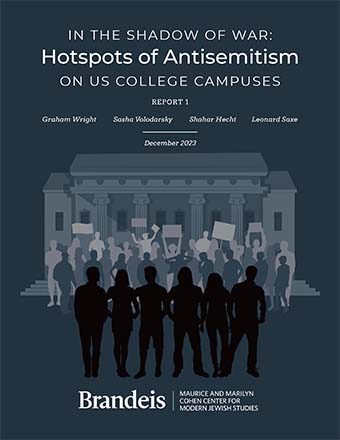
Report
December 2023
Graham Wright, Sasha Volodarsky, Shahar Hecht, and Leonard Saxe
“In the Shadow of War: Hotspots of Antisemitism on US College Campuses” describes Jewish students’ perceptions of antisemitism on 51 US college campuses in the wake of the Hamas-Israel war. The report includes our rankings of these schools by the level of antisemitic hostility perceived by Jewish students. We also explore the different forms of antisemitism experienced by Jewish students at these schools (including antisemitism related to criticism of Israel), their levels of concern about antisemitism from different sides of the political spectrum, and the extent to which they see hostility to Israel as emanating from students, faculty, or administrators. The report also examines how antisemitic hostility may be affecting Jewish students’ safety and sense of belonging on their campus.
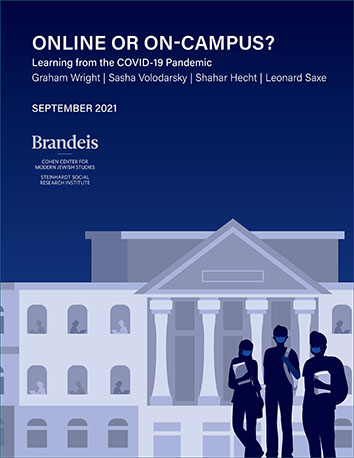
Report
September 2021
Graham Wright, Sasha Volodarsky, Shahar Hecht, and Leonard Saxe
This study uses the disruptions of the COVID-19 pandemic to investigate long-standing questions about the role of the physical campus in the undergraduate college experience. The findings are based on survey data collected in spring 2021 from random samples of undergraduate students at three elite, private universities in the Northeast. We examined how physical and virtual campus experiences at the three schools related to students’ perceptions of the quality of instruction and faculty engagement, their sense of belonging at their school, and their overall assessment of their mental health.
Journal article
February 2021
Graham Wright, Sasha Volodarsky, Shahar Hecht & Leonard Saxe
Since 2016, a series of horrific acts motivated by antisemitism appear to have caused a fundamental shift in the prevalence of antisemitism in the United States. Little is known, however, about how the events during this time have affected the day-to-day experiences and concerns of American Jews. Using repeated cross-sectional data from surveys of Jewish young adults who applied to Birthright Israel, this paper analyzes recent trends in Jewish young adults’ experiences and perceptions of antisemitism.
Contemporary Jewry (2021), https://doi.org/10.1007/s12397-021-09354-6
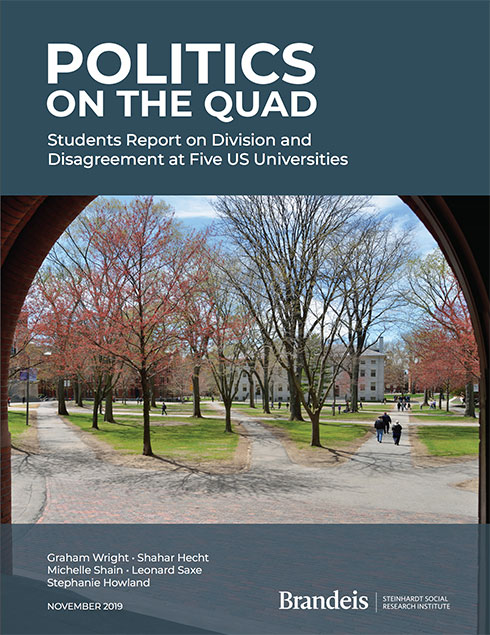
Report
November 2019
Graham Wright, Shahar Hecht, Michelle Shain, Leonard Saxe, Stephanie Howland
This report examines five institutions, Brandeis University, Harvard University, the University of Pennsylvania, the University of Michigan, Ann Arbor, and the University of Florida, Gainesville and explores two questions regarding the political climate on the college campus: 1) How divided are liberal, moderate, and conservative students at each of these five schools with respect to their political attitudes, their perceptions of the campus environment, and their place within the campus community? 2. How do these divisions differ in magnitude and nature from one campus to the next?
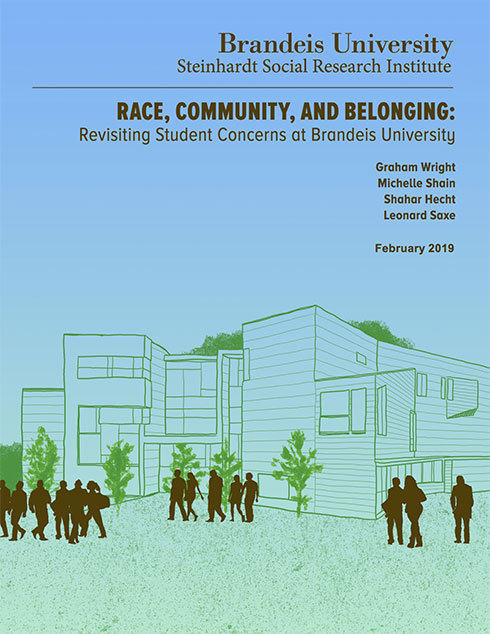
Report
February 2019
Graham Wright, Michelle Shain, Shahar Hecht, Leonard Saxe
This report follows up an earlier survey of the Brandeis campus in 2016 that resulted in All Together Separate: Race, Ethnicity, and Religion on the Brandeis campus. Repeating the survey in 2018 allowed us to examine the ways in which campus environments and intergroup relations change over time and determine whether the same issues continued to dominate campus conversation.
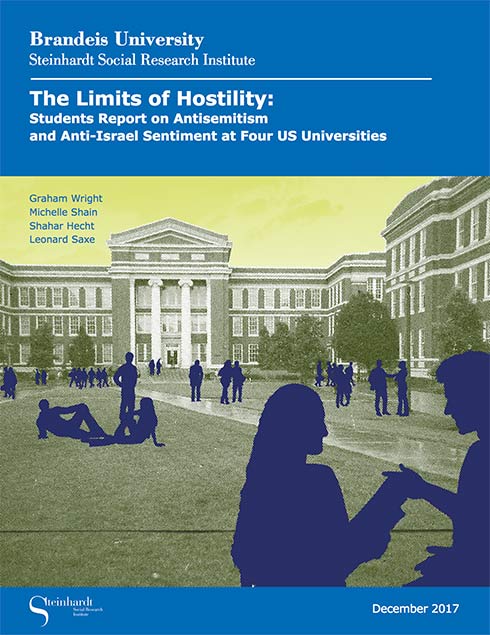
Report
December 2017
Graham Wright, Michelle Shain, Shahar Hecht, Leonard Saxe
This report is part of a program of research focusing on undergraduates and their perceptions and experiences of antisemitism and anti-Israel hostility on US campuses. This report examines four institutions, Brandeis University, Harvard University, the University of Pennsylvania (Penn), and the University of Michigan, Ann Arbor (Michigan). The report draws on survey data collected in the 2015-16 and 2016-17 academic years from representative samples of undergraduates (both Jewish and non-Jewish) at these schools.
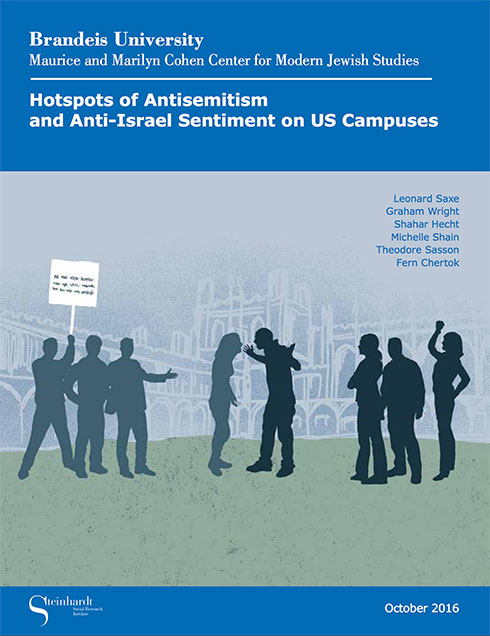
Report
October 2016
Leonard Saxe, Graham Wright, Shahar Hecht, Michelle Shain, Theodore Sasson, Fern Chertok
This report follows an earlier study that found that a substantial portion of Jewish students reported having been exposed to antisemitism and hostility toward Israel on their campuses. Because the extent of the problem varied considerably across campuses, we attempted in this report to identify "hotspots," or campuses where antisemitism and anti-Israel sentiment were especially acute. Based on findings from a 2016 survey of Jewish undergraduates at 50 US campuses, this study also looks at the particular manifestations of hostility at different campuses and the ways in which hostile climates influence the lives of Jewish students.
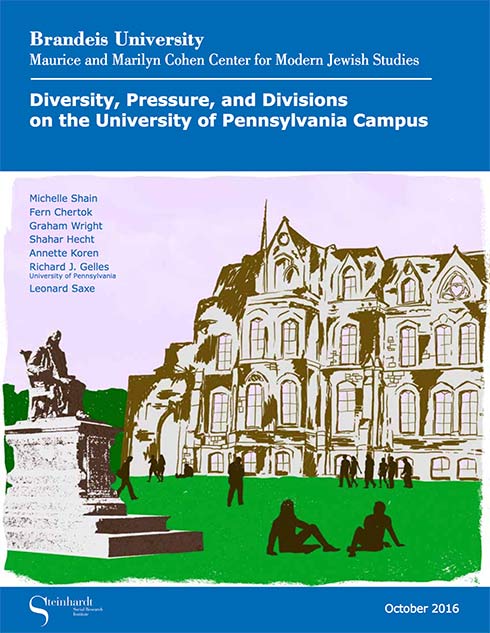
Report
October 2016
Michelle Shain, Fern Chertok, Graham Wright, Shahar Hecht, Annette Koren, Richard J. Gelles (University of Pennsylvania), Leonard Saxe
This report is the second in a series of reports on select campuses, and focuses on the University of Pennsylvania (Penn), historically, the most welcoming to Jewish students of all Ivy League schools. Based on a survey of both Jewish and non-Jewish students, the study presents a snapshot of the characteristics of Penn undergraduates in the 2015-16 academic year. It explores the intersection of racial, ethnic, and religious identities, gender, and sexual orientation, intergroup interactions, experiences of discrimination, and feelings of safety and belonging on campus in the context of the larger campus climate.
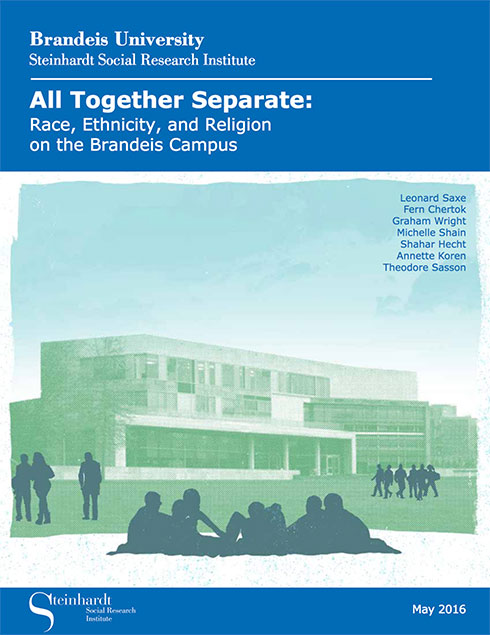
Report
May 2016
Leonard Saxe, Fern Chertok, Graham Wright, Michelle Shain, Shahar Hecht, Annette Koren, Theodore Sasson
Using Brandeis University as a case study, this study takes a broad view and explores a wide range of issues at the intersections of undergraduates’ racial, ethnic, and religious identities. The study surveyed Jewish and non-Jewish students regarding perceptions of inter-group relations, experiences of prejudice and discrimination, attitudes on contentious issues, and beliefs about the campus climate for free speech and critical discourse.
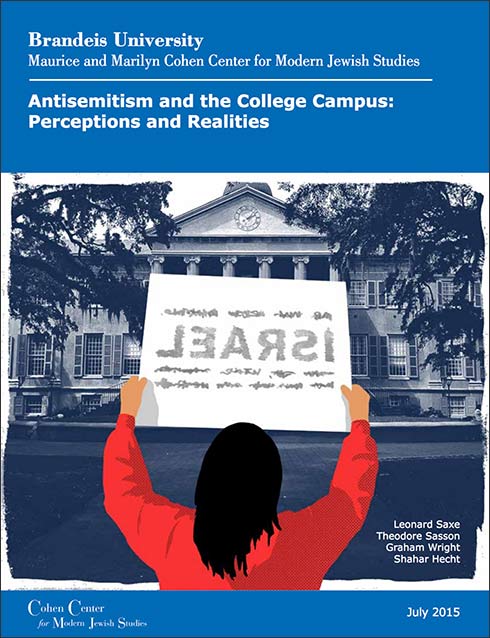
Report
July 2015
Leonard Saxe, Theodore Sasson, Graham Wright, Shahar Hecht
This report had two aims: first, to understand the extent of hostility toward Israel and antisemitism on North American campuses and second, to assess the relationship between these trends and Jewish students’ support for and connection to Israel. The study, conducted in spring 2015, draws on a survey of US and Canadian college students and young adults who applied to Birthright Israel.
Journal article
December 2008
Charles Kadushin and Elizabeth Tighe
Despite the academic successes of Jewish students on college campuses in the United States, challenges remain, particularly in terms of social involvement and ability to practice religion, much like the challenges that face students who are members of other ethnic and religious minorities. In this paper we examine data from 1,087 Jewish students at eight elite colleges and universities in the United States. The greater the percentage of Jewish students on campus and, individually, the more Jewish students feel connected to other students, including Jewish friends, the more at ease they feel. Those more engaged in Jewish religious practices experience greater difficulty, especially if there are no kosher dining facilities on campus. Both the “invisible hand” of social structure and the practical matters of Jewish observance affect Jewish students’ personal sense of ease. Contemporary Jewry 28, 1–20 (2008). https://doi.org/10.1007/BF03020930